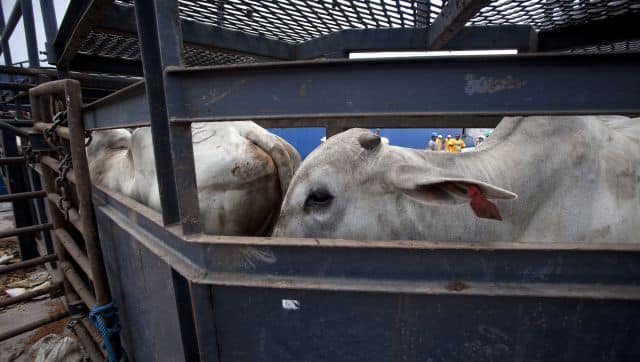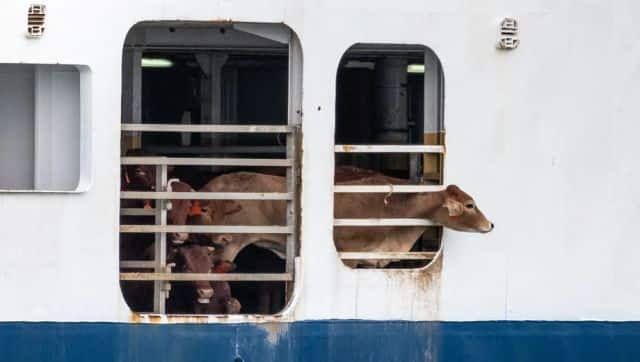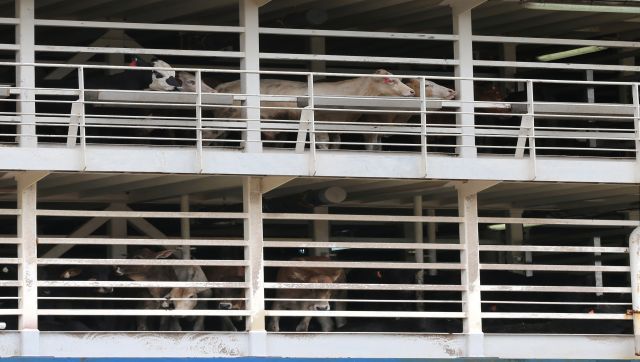The Houthis of Yemen, since the start of the Israel-Hamas war, have been wreaking havoc on the high seas. One could even say that their attacks are ba… ba… bad. Thousands of sheep and cattle have been stuck on board a ship off the Australian coast due to attacks on vessels in the Red Sea. The incident highlights not only how dangerous the Houthis have made sailing in the Red Sea but also the dangers associated with the imports of live animal and cattle for slaughter. As the Houthis continue their strikes in the high seas, we examine how it has affected cattle trade to Israel and what experts have to say about it. Animals stuck on ship in Australia The MV Bahijah, carrying 16,000 sheep and cattle, was enroute to Israel but has now returned to a port in Australia. This comes after the ship, which left for Israel on 5 January from Fremantle in western Australia, abandoned its journey through the Red Sea — where Houthi fighters in Yemen have been attacking ships — leaving the animals stuck on board for weeks. According to officials, there are roughly 14,000 sheep and 2,000 cattle, worth about Aus $2 million (Rs 10.95 crore), on board the vessel that has been sweltering in the heat, and raising questions about the health of the animals. On 20 January, the Australian agriculture and fisheries department had said that the vessel had been ordered to return “due to the worsening security situation” in the Red Sea, where Iran-backed Houthi rebels have launched drone and missile attacks on commercial ships. [caption id=“attachment_13682752” align=“alignnone” width=“640”] The MV Bahijah, with roughly 14,000 sheep and 2,000 cattle, left for Israel on 5 January from Fremantle in western Australia. However, it abandoned its journey on 20 January. Image Courtesy: X[/caption] However, they have not yet been allowed to disembark from the ship, owing to biosecurity concerns. The country’s government was quoted as telling Sky News that the animals were in good health and that supplies on the vessel were “being replenished to ensure the ongoing health and welfare of the livestock is upheld”. Moreover, two veterinarians on board have reported no sign of significant welfare concerns, Australia’s agriculture ministry added. Australia’s chief veterinary officer Beth Cookson was quoted as telling ABC News that there were no signs that the animals were unwell. “While I have only seen a preliminary report, there were no significant animal health or welfare issues identified,” Dr Cookson said, adding, “It also confirmed that there were no signs of exotic disease present in the livestock on board the vessel.” ‘Animal torture’ And despite the animals being on ship for almost a month, they haven’t been offloaded yet, inviting ire from animal rights activists. Farmers and industry groups are calling for the livestock to be offloaded from the vessel immediately due to growing concerns for the welfare of the animals as Perth is suffering through a heatwave this week. The Royal Society for the Prevention of Cruelty to Animals (RSPCA) unit of Western Australia has called for their offloading. CEO Ben Cave in a statement said it would be “cruel and barbaric” to send the animals out on a longer voyage after being stuck out at sea for several days. “Heatwave conditions are forecast for the rest of the week. These animals have already spent nearly a month on rolling seas in cramped conditions, standing in their own waste – there really is no other humane choice but to get them off the ship now,” he said. “To send them back out to sea on an even longer voyage would be cruel and barbaric.” [caption id=“attachment_13682762” align=“alignnone” width=“640”]
 Despite the MV Bahijah being docked at a port in Perth, the animals on board the vessel haven’t been moved yet. Australian authorities are yet to decide on the same. Image used for representational purposes/Reuters[/caption] These same sentiments were echoed by Senator Mehreen Faruqi, deputy leader of the Australian Greens party. In a Sky News report, she was quoted as saying, “Leaving sheep and cattle on the MV Bahijah in the scorching summer heat is animal torture. The government already made one gross error by approving this trip through a conflict zone. Sending them back out on another long journey is absolutely unacceptable.” However, a decision is yet to be made on the same. Agriculture Minister Murray Watt said the issue was a “big concern” for the community but it was ultimately a decision to be made by the exporter and the Department of Agriculture. “The decisions about the ship, and what it does and where it goes and whether it can export and whether it can’t, under the Australian law… (the) decisions (are) to be made exclusively by the Department of Agriculture,” he told ABC News. [caption id=“attachment_13682782” align=“alignnone” width=“640”]
Despite the MV Bahijah being docked at a port in Perth, the animals on board the vessel haven’t been moved yet. Australian authorities are yet to decide on the same. Image used for representational purposes/Reuters[/caption] These same sentiments were echoed by Senator Mehreen Faruqi, deputy leader of the Australian Greens party. In a Sky News report, she was quoted as saying, “Leaving sheep and cattle on the MV Bahijah in the scorching summer heat is animal torture. The government already made one gross error by approving this trip through a conflict zone. Sending them back out on another long journey is absolutely unacceptable.” However, a decision is yet to be made on the same. Agriculture Minister Murray Watt said the issue was a “big concern” for the community but it was ultimately a decision to be made by the exporter and the Department of Agriculture. “The decisions about the ship, and what it does and where it goes and whether it can export and whether it can’t, under the Australian law… (the) decisions (are) to be made exclusively by the Department of Agriculture,” he told ABC News. [caption id=“attachment_13682782” align=“alignnone” width=“640”] Israel is a key market of live cattle from Australia; data released by Meat and Livestock Australia shows that Israel is only the second country behind Kuwait as the largest importer of livestock by sea from Down under. Image used for representational purposes/Reuters[/caption] Australia’s cattle export to Israel This incident puts the focus on Australia’s live cattle export to Israel. Australia is a large exporter of live animals, shipping more than half a million sheep and half a million cattle last year. Israel is a key market of live cattle from Australia; in fact, data released by Meat and Livestock Australia shows that Israel is only the second country behind Kuwait as the largest importer of livestock by sea from Down under. The Telegraph reported that Israel received 86,100 sheep worth $6.5 million and 10,848 cattle worth $14 million from Australia in the first three months of last year. Some analysts have noted that the rise in Australian exports to Israel is owing to the significant decline in livestock numbers from European countries due to hot weather and drought conditions across southern Europe, which has effectively shrunk European herds and flocks. Live cattle export by ships and its dangers Several activists have deemed the export of cattle by sea over long distances as cruel and tantamount to torture. Animal rights activists say that packing thousands and thousands of animals together on a ship and made to travel for long distances is not only unfair to the animals, but is also dangerous for humans. In 2018, a whistleblower associated with Animals Australia showed footage of sheep on board these vessels covered in faeces and severely decomposed bodies left in pens with living sheep. Activists further complain that due to the distressing conditions animals are in, many don’t survive the journey at sea and it’s believed their corpses are just thrown overboard. [caption id=“attachment_13682802” align=“alignnone” width=“640”]
Israel is a key market of live cattle from Australia; data released by Meat and Livestock Australia shows that Israel is only the second country behind Kuwait as the largest importer of livestock by sea from Down under. Image used for representational purposes/Reuters[/caption] Australia’s cattle export to Israel This incident puts the focus on Australia’s live cattle export to Israel. Australia is a large exporter of live animals, shipping more than half a million sheep and half a million cattle last year. Israel is a key market of live cattle from Australia; in fact, data released by Meat and Livestock Australia shows that Israel is only the second country behind Kuwait as the largest importer of livestock by sea from Down under. The Telegraph reported that Israel received 86,100 sheep worth $6.5 million and 10,848 cattle worth $14 million from Australia in the first three months of last year. Some analysts have noted that the rise in Australian exports to Israel is owing to the significant decline in livestock numbers from European countries due to hot weather and drought conditions across southern Europe, which has effectively shrunk European herds and flocks. Live cattle export by ships and its dangers Several activists have deemed the export of cattle by sea over long distances as cruel and tantamount to torture. Animal rights activists say that packing thousands and thousands of animals together on a ship and made to travel for long distances is not only unfair to the animals, but is also dangerous for humans. In 2018, a whistleblower associated with Animals Australia showed footage of sheep on board these vessels covered in faeces and severely decomposed bodies left in pens with living sheep. Activists further complain that due to the distressing conditions animals are in, many don’t survive the journey at sea and it’s believed their corpses are just thrown overboard. [caption id=“attachment_13682802” align=“alignnone” width=“640”] A ship carrying between 20,000 and 30,000 sheep and cows from Australia heading to Israel. Activists call live cattle exports by seas the most cruel method. They say that due to the distressing conditions animals are in, many don’t survive the journey at sea and it’s believed their corpses are just thrown overboard. Image Courtesy: Israel Against Live Shipments/We Animals Media/X[/caption] Caroline Rowley, founder of Ethical Farming Ireland, has said, “Livestock vessels are terrible places for animals.” Most ships used to transport farm animals are past their prime, and there’s the added risk of stormy weather and sinking. Delays at sea, which strain limited feed supplies and increase the build-up of excrement, stress, and injury, are another common risk. However, realising the dangers, many countries have begun to ban the practice of live cattle, especially by sea. New Zealand banned exports of live animals after a vessel carrying more than 5,800 cattle sank in rough weather in 2020, leaving dozens of sailors missing and dead animals floating in the sea. Houthi trouble in the Red Sea The incident of the MV Bahijah abandoning its journey highlights the far-reaching consequences of recent attacks on ships by Houthi militia, who are backed by Iran. The fighters began attacking ships in response to Israel’s actions in the Palestinian enclave of Gaza. They have insisted they only target ships linked to Israel. The group has attacked many ships with drones, rockets and, in some cases, helicopters to drop its fighters onto commercial vessels. It has prompted several companies to divert their ships away from the Red Sea — which is the shortest sea route between Europe and Asia via the Suez Canal. This has caused delays, and is also driving up costs. According to Ryan Petersen, CEO of the supply chain management company Flexport, disruption to Red Sea trade lasting a year could surge goods inflation by up to two per cent. Jan Hoffmann, a UN shipping expert, also told the AP that Red Sea shipping snags posed a risk to global food security by slowing the distribution of grain to parts of Africa and Asia, which depend on wheat from Europe and the Black Sea area. With inputs from agencies
A ship carrying between 20,000 and 30,000 sheep and cows from Australia heading to Israel. Activists call live cattle exports by seas the most cruel method. They say that due to the distressing conditions animals are in, many don’t survive the journey at sea and it’s believed their corpses are just thrown overboard. Image Courtesy: Israel Against Live Shipments/We Animals Media/X[/caption] Caroline Rowley, founder of Ethical Farming Ireland, has said, “Livestock vessels are terrible places for animals.” Most ships used to transport farm animals are past their prime, and there’s the added risk of stormy weather and sinking. Delays at sea, which strain limited feed supplies and increase the build-up of excrement, stress, and injury, are another common risk. However, realising the dangers, many countries have begun to ban the practice of live cattle, especially by sea. New Zealand banned exports of live animals after a vessel carrying more than 5,800 cattle sank in rough weather in 2020, leaving dozens of sailors missing and dead animals floating in the sea. Houthi trouble in the Red Sea The incident of the MV Bahijah abandoning its journey highlights the far-reaching consequences of recent attacks on ships by Houthi militia, who are backed by Iran. The fighters began attacking ships in response to Israel’s actions in the Palestinian enclave of Gaza. They have insisted they only target ships linked to Israel. The group has attacked many ships with drones, rockets and, in some cases, helicopters to drop its fighters onto commercial vessels. It has prompted several companies to divert their ships away from the Red Sea — which is the shortest sea route between Europe and Asia via the Suez Canal. This has caused delays, and is also driving up costs. According to Ryan Petersen, CEO of the supply chain management company Flexport, disruption to Red Sea trade lasting a year could surge goods inflation by up to two per cent. Jan Hoffmann, a UN shipping expert, also told the AP that Red Sea shipping snags posed a risk to global food security by slowing the distribution of grain to parts of Africa and Asia, which depend on wheat from Europe and the Black Sea area. With inputs from agencies
Roughly 14,000 sheep and 2,000 cattle on board a ship bound for Israel have been stranded near the coast of Australia after the vessel abandoned its journey owing to Houthi attacks in the Red Sea. This incident shines a spotlight on the inhumane treatment meted out to animals during live export
Advertisement
End of Article


)

)
)
)
)
)
)
)
)



